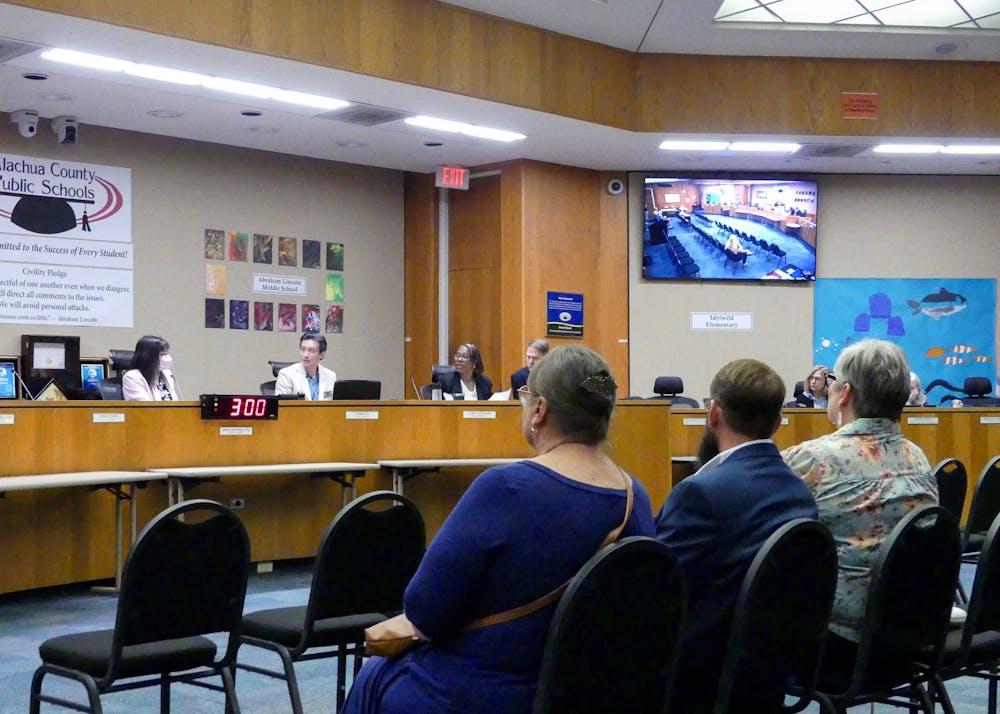The Alachua County School Board addressed controversy over a comment on Hulk Hogan’s death and approved the tentative budget and millage rate at a budget hearing Thursday night.
The board approved school meal prices, updated employee numbers and amended district policies at a regularly scheduled board meeting after the budget hearing.
Apology
Board Chair Sarah Rockwell began the budget meeting with an apology.
After posting a comment on her personal Facebook account, Rockwell faced criticism, including multiple death threats and the public release of her address, according to emails sent to her school board inbox.
“Oh, did Hulk die? I didn’t even know. Good. One less MAGA in the world,” Rockwell wrote in the deleted Facebook post.
Her comments received national attention, and Rockwell issued an apology on her school board member Facebook page Saturday.
The Alachua County Republican Party called for Rockwell’s resignation in a series of Facebook posts with the hashtag #resignrockwell.
Florida House Representative Kat Cammack responded to the virality, taking to X.
“As their federal Representative, I look forward to meeting with Sarah and @AlachuaSchools to discuss their federal funding,” Cammack wrote.
Rockwell said she “deeply regrets the highly inappropriate” comment.
“This mistake was mine alone, and I regret that it has distracted from the important work we’re doing in this district,” Rockwell said at Thursday’s meeting. “I’m choosing to respond with humility, a commitment to personal growth and a renewed dedication to this district.”
Rockwell mentioned the threats during her speech, stating while she remains fully accountable for her actions, she doesn’t condone political violence.
“No one, especially my children, should be put at risk for my mistake,” she said.
Rockwell said she will no longer speak publicly on the topic after Thursday night.
Board member Jeanine Plavac followed Rockwell’s remarks, reading her celebratory post aloud.
Plavac called Rockwell’s comments a “clear breach of community values.” She received emails calling for Rockwell’s resignation, she said.
“We must hold our leaders to our highest standards,” Plavac said. “For those that emailed me asking for that, I advised them that the governor was the only person that could exercise that authority.”
Plavac is a DeSantis-appointed board member who filled a nearly four-month ACSB vacancy. She said the governor appointed her not based on her “conservative values,” but for her passion for teaching, her contribution to nonprofits and the "importance of her faith.”
“I have never professed to be anything more than a nurse of 49 years who values life,” Plavac said. “A teacher who has taught her students for 21 years the importance of integrity … and a conservative who respects and loves this country.”
Plavac said Rockwell “crossed the line” with her comments.
Plavac responded to angry community members over email Monday with hopes Rockwell would “voluntarily” remove herself from the board.
“I have already written to the Governor because he is the only one that can remove her from the board since it is an elected position,” Plavac wrote to a community member over email. “I hope that Dr. Rockwell voluntarily makes the necessary change needed in leadership on the board before that time.”
Plavac’s comments were sharply criticized by Board Member Thomas Vu, who read her email aloud.
Vu called the reaction to Rockwell’s comments “extreme” and part of a community-wide "selective outrage.”
“There is no scenario where threats of physical harm or harassment toward any single person, let alone their family, is acceptable or justified,” Vu said. “It really is clear there are many people in this community hell-bent on destroying public education and are using this as a wedge issue.”
Board vice-chair Tina Certain condemned Plavac’s email, which she forwarded to board members “on several occasions.”
Plavac “threw Rockwell under the bus,” she said.
“You were appointed, the four of us were elected,” Certain said. “We didn’t box you out because you were appointed by the governor, and I have tried to extend myself.”
Even while mentioning her political views as a reason for her appointment, Plavac didn’t “extend grace” to Rockwell in the same manner, Certain said.
Community members expressed support for Rockwell during public comment at the regularly scheduled board meeting.
Evan Meyer, an ACPS and UF graduate, said Rockwell’s post was her “personal opinion about a rich, elite celebrity.”
“This right-wing cancel culture mob is equating bullets with celebrity discourse,” Meyer said. “I did not hear a celebration of death. I heard a declaration of indifference.”
The crowd began arguing after a public commenter who only went by the name Jeremy began speaking.
Jeremy said Rockwell should step down if she has a “shred of integrity in her body,” later calling her a “disgusting, vile human being.”
Certain ordered for Jeremy’s removal, who was approached by two resource officers on scene.
Board Attorney David Delaney said he shouldn’t be removed.
While the board questioned whether to remove Jeremy, audience members shouted, “Get him out,” while another community member commandeered the commenter podium microphone.
“He’s a white supremacist, get his ass out!” the community member shouted, her words ringing through the loudspeaker’s hot mic.
The crowd increased in volume, shouting and clapping for his removal. The board cut its microphone feeds and called for an immediate recess.
Tentative budget and millage rate
The board unanimously approved the tentative budget and millage rate for the 2025-26 fiscal year.
Florida’s Truth in Millage law requires local governments to calculate and publicly disclose the comparison to help taxpayers understand whether taxes are rising due to rate changes or rising property values.
Millage rate is the proposed property tax rate and is set at 6.2510 mills. In Florida, “mill” is set at $1 in tax per $1,000 of taxable value.
The proposed rate is 5.07% higher than the “rolled-back rate.” The rolled-back rate is the amount that would generate the same revenue as the previous year, excluding new construction.
The board will vote whether to adopt the proposal during a final budget hearing scheduled for Sept. 9.
The total millage rate for ACPS is made up of four parts: operating funds, state-mandated local effort, voter-approved funding and capital projects and maintenance.
The tentative rate details 3.0030 mills in state-mandated local effort, or the amount the district must collect from local property taxes to receive state education funding. Florida school districts are required to levy the mill, which is expected to bring about $82.8 million.
The rate sets 1.5 mills for capital projects and maintenance that goes toward funding repairs, maintenance, security upgrades, buses and equipment. While state-authorized, it’s locally controlled and is expected to raise about $41.4 million.
The rate sets 1.0 mill in voter-approved funding, which is expected to raise about $27.6 million. It’s attributed to the local property tax renewal approved by Alachua County voters in November 2024 called “One Mill for Schools.”
Under the measure, the district matches the statewide property tax rate to fund programs outside the state budget, such as school nurses, career-tech programs and classroom technology. Just over 76% of voters supported the referendum in November 2024..
At its lowest rate, the tentative plan generates about $20.6 million, detailing 0.7480 mills in discretionary operating funds. The funds cover basic daily operations, including utilities, staff salaries, supplies and services not fully funded by the state.
The millage rate doesn’t directly set ACPS’ budget. The budget outlines how much the district expects to spend, and the millage rate determines how much local property tax revenue funds it.
This year’s total millage is expected to generate around $172 million in local tax revenue, or roughly 29% of the district’s tentative $585 million budget.
The tentative budget allocates about $175 million for classroom instruction, $38 million in operating funds and $18 million for school-level administration, which covers student services, teacher training and transportation.
Florida school districts heavily rely on state dollars to cover daily operations and long-term infrastructure. Most funding comes from the Florida Education Finance Program, the state’s enrollment-based school funding formula.
This fiscal year will see an increase in the state’s Base Student Allocation by $41.62 per student, bringing the per-student amount to $5,372.60.
Other state dollars arrive through categorical funds earmarked for specific uses, including transportation, instructional materials or school safety, which can’t be redirected to cover unrelated expenses.
Separate from operational dollars is Public Education Capital Outlay, a program that helps districts pay for major building renovations, security upgrades and school construction. PECO funds vary year to year and aren’t guaranteed.
PECO funds were not awarded to Alachua County Public Schools for 2025-26, meaning the district must rely on local millage and other funding sources for facility investments.
Board meeting
The board approved school meal prices, updated employee numbers and amended district policies at a regularly scheduled board meeting following the budget hearing.
Before the board voted on action items, the first public comment section ensued.
After heated comments about Sarah Rockwell led to the recess, the board chair was absent for the remainder of the meeting. She was listed as “not present at vote” on the board’s virtual agenda.
Meal prices
The board approved meal prices for the 2025-26 school year, keeping the same prices across all grade levels.
Breakfast prices are set at $0.30 for reduced meals, $1.50 for paid student meals and $3.15 for adult meals.
Lunch prices are $0.40 for reduced meals, $2.50 for elementary paid meals, $2.75 for secondary paid meals and $5.00 for adult meals.
Updated employee numbers
More than 120 ACPS employees officially resigned ahead of the 2025-26 school year, including several principals, counselors, custodians and classroom teachers, according to the district’s latest personnel report.
Most of the resignations were effective as of early June and span nearly every level of the district’s workforce, ranging from instructional staff to executive administrators to food service workers.
The personnel report includes nearly 70 instructional resignations and over 50 resignations from non-instructional staff. Reasons for resignation weren’t listed.
Alachua County’s first day of school is scheduled for Aug. 11.
District policy changes
The board adopted a slate of policy changes, including one about public participation during meetings.
The amendment clarifies procedural language and removes outdated or redundant language, according to the policy document.
The update formally sets public input deadlines on action items, specifying public comment forms must be submitted no later than 15 minutes after the meeting starts.
It declares the board chair can stop, interrupt or warn speakers when their time is up.
Residents who miss the first public comment portion, which is held before board votes, will speak after voting items. The policy extends maximum speaking time during the first portion from two minutes to three.
A second comment period near the meeting’s conclusion is still available for non-action topics.
Before Thursday’s approval, the board held its first reading of the proposed changes May 6 and a public hearing June 3.
The next ACSB meeting is Aug. 19.
Contact Sara-James Ranta at sranta@alligator.org. Follow her on X @sarajamesranta.

Sara-James Ranta is a UF journalism senior, minoring in sociology of social justice and policy, and The Alligator's Spring 2026 digital managing editor. She previously worked as The Alligator's metro editor, K-12 education reporter and university reporter. In her free time, SJ is watching a new show, listening to EDM or discussing Star Wars.






